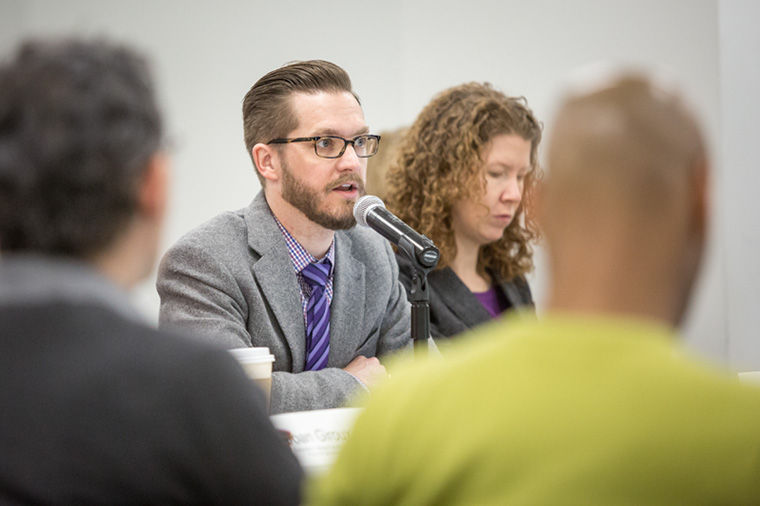Faculty Senate discusses performance-based raises and ‘Big Chicago’ courses
Greg Foster-Rice, president of The Executive Committee of the Faculty Senate during a Facutly Senate meeting at 33 E Congress on Feb 12.
February 15, 2016
The Faculty Senate passed a motion regarding the eligibility of faculty for performance-based raises at the first meeting of the Spring 2016 Semester on Feb. 12.
“The Faculty Senate recommends the provost change the guidelines for performance-based salary increases to reflect eligibility for all full-time faculty members, without exception,” said Gregory Foster-Rice, president of Faculty Senate and an associate professor in the Photography Department. “While we are appreciative of this performance-based increase, there are several issues of concern regarding [the] process of evaluation and equity.”
The motion passed with nine abstentions and none opposed.
The eligibility guidelines for increases exclude faculty below the level of associate professor and full-time lecturer as well as faculty who have received raises after May 2015, Foster-Rice said.
Jeff Abell, an associate professor in the Art & Art History Department, said he appreciates the merit pay system offered by the administration but agrees it needs to be a faculty-wide offering.
“Encouraging faculty to achieve at the highest level possible is a terrific idea if we had a level playing field to start with,” Abell said.
The motion only mentioned faculty eligibility for increases, but it sparked a discussion about the advantages and disadvantages of the increases.
“I am in support of the general idea of performance raises,” said David Tarleton, an associate professor in the Cinema Art + Science Department. “Performance-based raises cannot be instead of cost-of-living adjustments; they have to be in addition to cost-of-living.”
The consistency of the evaluation process for faculty is a point of concern, said Larissa Mulholland, associate chair of the Education Department.
“One of my big concerns is that the college is trying to establish consistent policies across departments,” Mulholland said. “I am not sure we are ready to evaluate the performance of professors across the college equitably.”
Department chairs will provide recommendations to the provost for performance-based salary increases based on the metrics available to them, such as student evaluations, Foster-Rice said.
Neil Pagano, associate dean of the School of Liberal Arts & Sciences, visited the Senate to share results of findings regarding the “Big Chicago” courses that were piloted during the Fall 2015 Semester.
According to Pagano, the courses will continue being offered to incoming freshmen during the Fall 2016 Semester.
Pagano discussed the findings of the evaluation of the course through student surveys, focus groups, graduate teaching assistant surveys, assessing student work, briefings with professors and class visits.
“Students appreciated learning about new things,” Pagano said. “Many students commented that the way the classes were run really helped make the class seem not like a large lecture.”
A lecture-style class does not mean students are subjected to a negative experience, said Alton Miller, an associate professor in the Communications and Media Innovation Department, who taught a Big Chicago course called “50 Years of Civil Rights in Chicago”
“I want to recommend that everyone re-examine their preconceptions about how a big class works at Columbia,” Miller said. “It may be a very useful model going forward.”








